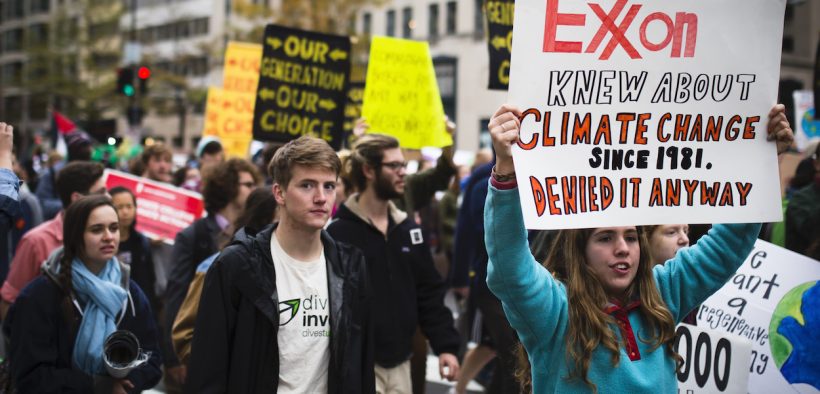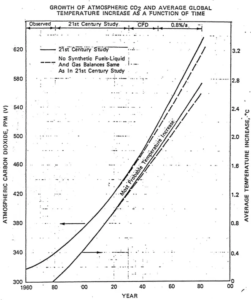Who Committed the Worst Crime Against Humanity?

Exxon: For Suppressing Research Supporting Climate Change
What’s 1982 best remembered for? The outbreak of the Falklands War? Maybe the release of Michael Jackson’s majestic album Thriller? But the year the worst crime against humanity was committed, really?
In 1982 Exxon shared research on the effects of carbon dioxide released by fossil fuels to management. The findings were seismic. The report found a close relationship between increases in CO2 levels and increases in the global temperature.
What did they do with the research? They suppressed it. Knowing the findings would place them under the spotlight. The study proved Exxon’s own product (fossil fuels) was creating a monumental problem. A problem that would threaten humanity in the 21st century. Hardly the best PR.
“CO2 Greenhouse Effect: Technical Review, p. 14”. Figure 3 from the report shows just how accurate the findings were. As of August 5th, 2019 atmospheric CO2 levels stood at nearly 412 PPM, global average temperatures are 1.2 degrees above preindustrial levels. These figures correspond with Exxon’s findings. (caption under graph)
From the perspective of Exxon, what purpose did it serve their interests to publicize the findings? With revenue exceeding $108 billion this was the biggest company in the world. They were doing just fine as they were thank you very much.
Morally this decision is breathtaking in its greed, self-interest and short-sightedness.
But 38 years on ExxonMobil (Exxon merged with Mobil in 1998) are still supplying the world with fossil fuels. And we’re still very much on course to experience temperature increases threatening humanity.
The Worst Crime Against Humanity?
What comes to mind when you think of the worst crime against humanity? It’s hard to look past mass genocide. Genocide is a crime of unparalleled brutality.
Exxon’s decision pales in comparison to the Holocaust or the Cambodian genocide. But its ramifications have the potential to cause pain and suffering on an unimaginable scale.
Exxon’s crime isn’t what they did do, but what they didn’t. The irony is the initial decision to carry out research on the relationship between CO2 and the global temperature was a good thing. But this wasn’t a valiant gesture taken in the interest of the public good. Exxon commissioned the research to gain understanding and stay ahead of the game.
To add salt to the wounds, by suppressing the research, Exxon didn’t commit a crime. This says more about our law system than anything else. People had a right to know our current path was leading us towards catastrophe. And yet, because the research would have negative implications on Exxon’s business they chose to keep it secret.
Even now, knowing what they did, no legal action has been taken against the company. These executives are able to make decisions that could impact the lives of millions with impunity. And they know it.
Oil and gas companies spend millions of dollars on lobbyists to push against climate change policy. Policies helping to tackle the effects of their products. The arrogance, callousness and disregard for their actions is beyond belief. Talk about cutting off your nose to spite your face.
That Exxon still makes concerted efforts to protect their self-interest seems to be utter madness. But,
In a mad world, only the mad are sane.
Akira Kurosawa
Why Did Exxon Suppress the Information?
In a world gone mad to understand Exxon’s decision making, we need to see the world from their eyes. They don’t exist for the benefit of society. They exist to maximize returns for their shareholders.
The interests of the company are in direct competition with the interests of humanity. They want us to continue our dependence on fossil fuels as this creates returns for shareholders.
Exxon placed the short term interests of their business and shareholders ahead of the long term interests of humanity. From their perspective, it was a logical decision. In fact, it was the only decision they could have made.
Imagine Exxon’s executives called a shareholder meeting as a result of the findings. With the intention of announcing they were restructuring their business model.
The headline from the announcement may have been along these lines. The long term viability of fossil fuels has been put into question. The problem requires a transformation of the global system towards a low carbon economy. The future is renewable energy. Exxon‘s vision is to be a pioneer and lead the way in this transformation, cementing the long term future of the company, and with it, humanity.
This would have caused uproar. Shareholders would have considered the board of directors hippy loving environmentalists. A threat to the shareholder’s investment. The board would have found themselves without a job quicker than you can say climate. Not to mention reputations left in tatters.
From this perspective, Exxon had no choice. They had to suppress the information and continue on the path of business-as-usual.
It Could All Have Been so Different
Imagine Exxon had looked at the evidence as an opportunity? One where they could lead the transition to a renewable, low carbon economy. They could have made investments in a low carbon economy before anyone else was talking about the problem.
Exxon’s decision could have instigated other oil and gas companies to follow suit. The trickle-down effect of this transformation would have been remarkable. The world would be a very different place if executives at Exxon had shown the leadership that’s still so desperately needed to transition to a low carbon economy.
But this is pure speculation. They didn’t see the evidence as an opportunity but as a threat to their current way of doing things. The executives took the easy option, hide the evidence, and reap the rewards of doing so. Greed and self-interest prevailed.
In a corporate world fuelled by short term maximization of profit, this isn’t a surprise.
38 years on, we’re in the midst of a climate catastrophe threatening the existence of humanity. The decision seems bizarre if you consider the success of any business relies on us buying their products. If there aren’t any humans, there is no ExxonMobil.
That it was logical for Exxon to suppress the report symbolizes the era we live in. The fact they were able to do this from a legal perspective reflects a law system in desperate need of reform.
We live in an era dominated by greed and self-interest. If we’re around in 100 years Exxon’s short sight sighted decision will go down in infamy.













The “worst crime against humanity”? As George HW Bush said, “I shoulda pulled out!”